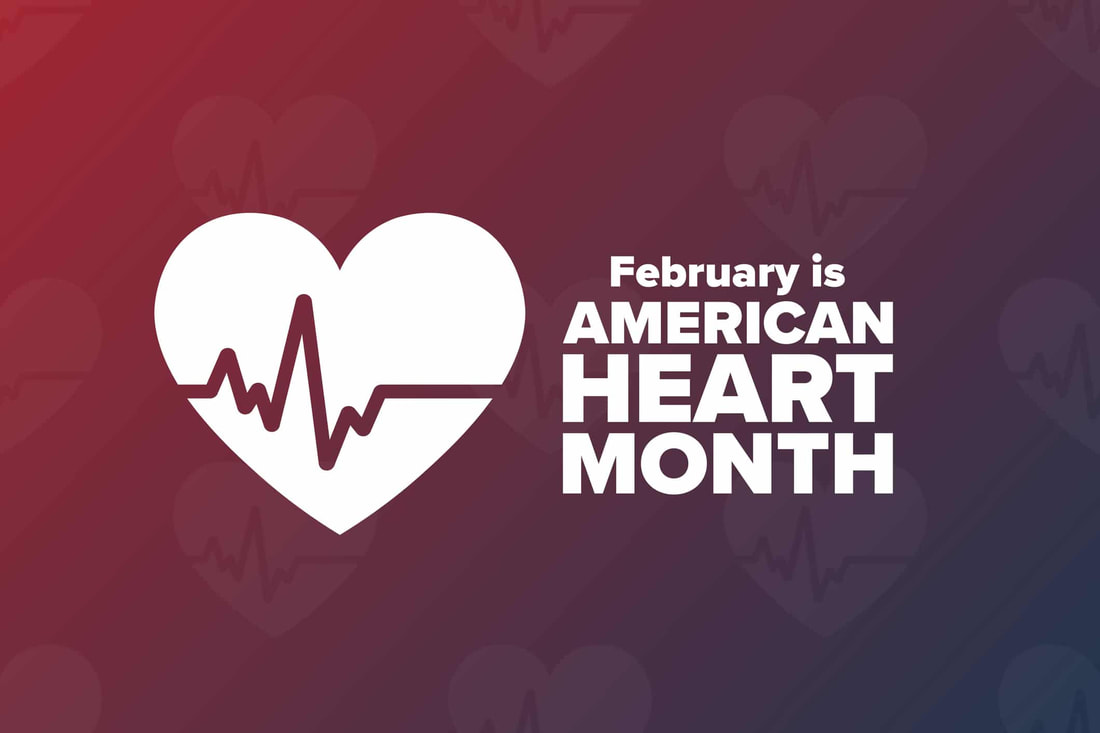Tips for a Healthy Heart Proverbs 4:23 Above all else, guard your heart, for it is the wellspring of life.
February is American Heart Month. Heart disease is the leading cause of death of Americans, taking the lives of 2,200 people each day. In addition, 103 million adults have high blood pressure and 6.5 million are living with heart failure. While genetic factors do play a part in cardiovascular disease, the good news is 80 percent of cardiovascular diseases may be preventable with education and action. Simple lifestyle changes can make a big impact when it comes to heart health. Show your heart some love with these 8 tips. 1. Stop smoking Quitting smoking is the best thing that can be done for the heart and for overall health. Smoking is the most preventable cause of premature death in the United States, and smokers have a higher risk of developing many chronic disorders, including atherosclerosis, or the buildup of fatty substances in the arteries. When combined with other heart disease risk factors, smoking increases the risks associated with those factors. Quitting is never easy, but there are lots of helpful resources for those looking to start. 2. Know your numbers Maintaining a healthy weight, blood pressure and total cholesterol play a significant role in maintaining a healthy heart. While there are standard guidelines for blood pressure and cholesterol, ideal weight goals are individual to each person. A physician can help determine an appropriate goal weight based on additional factors such as age and height. 3. Screen for diabetes Untreated diabetes can lead to heart disease, among many other complications. Diabetes can be easily detected through a simple blood test and managed a variety of ways under the care of a physician. 4. Get active Heart pumping physical activity not only helps to prevent cardiovascular disease but can also improve overall mental and physical health. The American Heart Association recommends five 30 minute moderate exercise sessions each week. While this may seem daunting, it is important to note that these sessions can be broken up into two or three 10 or 15-minute segments throughout the day. Walking, jogging, biking and swimming are all great forms of exercise. It is important to remember that something is always better than nothing. Opting to take the stairs and parking farther back in the parking lot are great ways to squeeze in activity when the time is short. 5. Build some muscle Strength training compliments cardiovascular exercise by toning muscles and burning fat. In addition, proper strength training can improve daily functional movements, decreasing the chance of injury. The American Heart Association recommends getting in two days of moderate to high-intensity strength training each week. 6. Eat smart A healthy diet full of heart-smart foods is essential to a healthy heart and lifestyle. Salmon, nuts, berries, and oats are just a few of the heart “superfoods” that may help reduce the risk of atherosclerosis. Dark chocolate is also on the list and is a great way to satisfy a sweet tooth (in moderation). 7. Limit junk To reap the full benefits of a heart-healthy diet, it’s important to limit intake of nutrient-poor junk foods. Added sugars, saturated fat and excessive sodium can all negatively impact heart health, as well as overall physical health. These foods, when eaten in excess, can cause weight gain, raise blood pressure and clog arteries, which are all risk factors for heart disease. 8. Stress less Stress increases cortisol, which leads to weight gain, a key risk factor for heart disease. In addition, stress can lead to other unhealthy habits, making it harder to stick to a heart-healthy program. Stress can also decrease overall happiness and increase the risk for anxiety and depression. Many of the items on this list can also help with reducing stress, in addition to practicing positive self-talk and incorporating mindfulness meditation breaks throughout the day. (American Heart Association) February is a great time to try a new heart healthy activity in your congregation. There are many programs a congregation can develop and implement that encourage healthy lifestyle changes, while supporting one another, which can lead to life saving changes in your health. A few ideas for Adult Ministries and Congregational Health Ministries in your congregation include: 1. Hosting a weekly walking group, or encourage church members to walk in pairs. This increases accountability, and also helps make those daily walks much more fun! 2. Host a blood pressure screening at your church! Hypertension is painless, insidious, and often goes undetected for years. Blood pressure screenings quickly detect hypertension, and can encourage individuals to follow-up with their PCP or Cardiologist. 3. Pick a Sunday in February to wear red, to highlight heart health! 4. Host a guest speaker from your local hospital to speak about heart health, or nutrition! Invite families and your community members to attend! 5. Host a blood drive for your town! 6. Offer heart healthy snacks during meetings, events, and Bible Studies, instead of the typical bagels, pastries and high carbohydrate offerings. If you have any questions, please reach out to see how I can help! We would love to hear how your congregation promotes heart health! In His joy and service, Colleen Bottcher RN, BSN, FCN NJ District Parish Nurse email: [email protected]
0 Comments
Leave a Reply. |
Photo from Treadmill Guru

